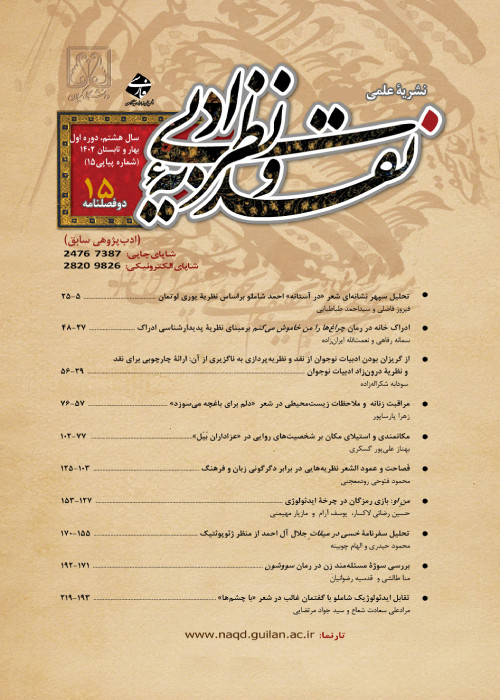A Study of the Modern Subject in Hedayat’s The Blind Owl and Sadeqi’s The Heavenly Kingdom
Subject and subjectivity are among the elements which can help determine a story as modernist. The modern subject reflects on itself, thus many characters in the modernist fiction think about themselves and their life and thoughts are the focus of the story. Concentration on ‘characters’ and their thoughts are of great importance in modernist fiction, which is less noticeable in pre-modern fiction. In Persian modernist fiction, there are two works in which such a concentration can be particularly observed, i.e. Sadeq Hedayat’s The Blind Owl and Bahram Sadeqi’s The Heavenly Kingdom. In both of these novels, the characters and their thoughts are central. In this study, first, the characteristics of the subject are listed, then a relatively precise definition of the subject is provided, and finally it is shown that the main characters of these two novels are subjects and the features of subjectivity are discernable in them. Consciousness, agency and individuality are the main features of subjectivity which are all studied in relation to the main characters of these two stories.
In the past century, a number of Iranian writers have produced stories that can be viewed as examples of modernist fiction. One of the most important features of characters in modernist fiction is their subjectivity. In the present study, Hedayat’s TheBlind Owl and Sadeqi’s The Heavenly Kingdom, as two prominent modernist works of Iranian fiction, have been examined, with the subjectivity of their major characters being the main focus of attention. Both of these works are character-centered and the stories revolve around the minds of the characters. In other words, everything is filtered through the minds of the characters and there is no objective reality in them.
The definition of modern fiction is closely associated with the definition of modern personality, resulting in the development of different ideas about the modern personality. Subjectivity, as highlighted by modernist critics, is an important feature of modernist fictional characters. While the subject is defined in different ways, in the present study we have relied on the definition accepted by the majority of modernist critics. The subject, according to scholars in this field, is characterized by awareness, freedom, and individuality.
In the present study, first, by drawing on the ideas of scholars in this field, a definition is offered for subjectivity, based on which the subjectivity of the main characters in Hedayat’s TheBlind Owl and Sadeqi’s The Heavenly Kingdom will be analyzed. Then the most prominent features of these characters will be examined.
The main characters of two important Iranian modernist novels were examined and it was found out that both characters share their ideas about subjectivity with the reader and enjoy their free will and individuality.
In The Blind Owl, the narrator knowingly speaks about the characteristics of subjectivity, shares his ideas with the reader and even analyzes them. He examines every idea rigorously and refuses to accept any idea as a presupposition. He questions the ideas instilled into him by society and tradition and tries to redefine them. His ideas about life and death are the result of his individual awareness. He tries to protect his free will and freedom and influence people surrounding him, even by inflicting violence on them. In The Heavenly Kingdom, Dr. Hatam has devised a plan through which the characteristics of subjectivity can be found in this personality. He sometimes speaks about these characteristics directly and reveals subjective awareness in his ideas in his solitude. He thinks about his own life more than anything else and is aware of the differences between himself and others. Dr. Hatam uses his free will and freedom to joyfully torture and even kill others. He cannot view others as human beings similar to him, and by disregarding all presuppositions he starts to think about himself and others.
- حق عضویت دریافتی صرف حمایت از نشریات عضو و نگهداری، تکمیل و توسعه مگیران میشود.
- پرداخت حق اشتراک و دانلود مقالات اجازه بازنشر آن در سایر رسانههای چاپی و دیجیتال را به کاربر نمیدهد.



